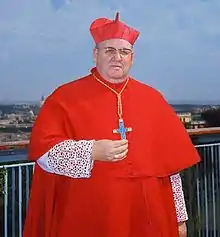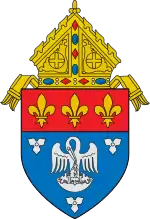John Cody
John Patrick Cardinal Cody (December 24, 1907 – April 25, 1982) was an American bishop and cardinal of the Roman Catholic Church. A native of St. Louis, he served as Bishop of Kansas City–Saint Joseph (1956–1961), Archbishop of New Orleans (1964–1965), and Archbishop of Chicago (1965–1982). He was named a cardinal in 1967.
John Patrick Cody | |
|---|---|
| Cardinal, Archbishop of Chicago | |
 | |
| See | Chicago |
| Appointed | June 14, 1965 |
| Installed | August 24, 1965 |
| Term ended | April 25, 1982 |
| Predecessor | Albert Gregory Meyer |
| Successor | Joseph Bernardin |
| Other posts | Cardinal-Priest of Santa Cecilia in Trastevere |
| Orders | |
| Ordination | December 8, 1931 by Francesco Marchetti-Selvaggiani |
| Consecration | July 2, 1947 by Joseph Ritter |
| Created cardinal | June 26, 1967 by Paul VI |
| Personal details | |
| Born | December 24, 1907 St. Louis, Missouri |
| Died | April 25, 1982 (aged 74) Chicago, Illinois |
| Previous post |
|
| Motto | MAGNIFICAT ANIMA MEA (MY SOUL DOTH MAGNIFY) |
| Coat of arms |  |
| Styles of John Cody | |
|---|---|
 | |
| Reference style | His Eminence |
| Spoken style | Your Eminence |
| Informal style | Cardinal |
| See | Chicago |
Ordination history of John Cody | |||||||||||||||||||||||||
|---|---|---|---|---|---|---|---|---|---|---|---|---|---|---|---|---|---|---|---|---|---|---|---|---|---|
| |||||||||||||||||||||||||
| |||||||||||||||||||||||||
Early life and education
John Cody was born in St. Louis, Missouri, to Thomas Joseph and Mary (née Begley) Cody.[1] His father was an Irish immigrant who became deputy chief of the St Louis Fire Department. After attending Holy Rosary Parochial School, he entered St. Louis Preparatory Seminary at age 13.[2] He remained at St. Louis until 1926, when he was sent to continue his studies at the Pontifical North American College in Rome.[2] He earned a Doctor of Philosophy degree (1928) and a Doctor of Sacred Theology (1932) from the College of the Propagation of the Faith.[2]
Priesthood
Cody was ordained to the priesthood by Cardinal Francesco Marchetti Selvaggiani on December 8, 1931.[3] He remained in Rome for the next six years as a staff member of the North American College and an official of the Vatican Secretariat of State.[1] In 1938, he earned a Doctor of Canon Law degree from the Pontifical Roman Athenaeum S. Apollinare, and was awarded the Benemerenti medal for his services to the Secretariat of State.[2] Upon his return to the United States, Cody served as private secretary to Archbishop John J. Glennon until 1940, when he became chancellor of the Archdiocese of St. Louis.[1] He was named a privy chamberlain in 1939 and a domestic prelate in 1946.[2] He accompanied Archbishop Glennon to Rome when the latter was named a cardinal, and was on hand when Glennon died on the return trip.
Bishop
On May 10, 1947, Cody was appointed Auxiliary Bishop of St. Louis and Titular Bishop of Apollonia by Pope Pius XII.[3] He received his episcopal consecration on the following July 2 from Archbishop Joseph Ritter, with bishops George Joseph Donnelly and Vincent Stanislaus Waters serving as co-consecrators, at the Cathedral of St. Louis.[3] He was appointed coadjutor to the Bishop of Saint Joseph, Missouri, on January 27, 1954. He was appointed Bishop of Kansas City–Saint Joseph, Missouri, on August 29, 1956, and installed October 11, 1956. In 1961, he was transferred to New Orleans, Louisiana, where he was appointed coadjutor to the archbishop on August 14, 1961, appointed apostolic administrator on June 1, 1962, and acceded to the See of New Orleans on November 8, 1964. He became an object of national attention as archbishop, due to his predecessor Joseph Rummel's efforts to desegregate the Catholic schools in the archdiocese. Cody was opposed to integrating the schools but did not stop the efforts.[4]
Archbishop of Chicago
Controversy
Cody was appointed Archbishop of Chicago, on June 14, 1965, and installed August 24, 1965. He was elevated to cardinal on June 26, 1967. Cody's time in Chicago was marked by strife and controversy, including federal investigations of financial improprieties and an ambiguous relationship with Helen Dolan Wilson, who was alleged to be his mistress.[5][6] Wilson, who "followed (Cody's) every move" for a period of some 25 years, was alleged to have received large sums of money diverted by Cody, some of which were used to purchase "a house in Boca Raton ... a luxury car, expensive clothes and furs, and holiday cash presents."[7]
Despite the fact that approximately $1 million of church funds disappeared under Cody's tenure,[8] and the National Conference of Catholic Bishops lost more than $4 million in a single year while Cody was treasurer of that organization, all investigations were suspended upon Cody's death.[9]
Roy Larsen, the religion editor of the Chicago Sun-Times wrote:
"Legally, the investigations by the paper and the federal prosecutors ended inconclusively. In that sense, the legal tactics followed by Cody and his lawyers--chiefly a strategy of delays and stalling--succeeded in preventing any indictments. Eight months before the first story was published, the US Attorney's office issued subpoenas to Cody and the archdiocese, but the information that was sought was never turned over to the government. Even after the series was published, the stonewalling continued. A new US Attorney, Dan Webb, had taken over the investigation and issued new subpoenas, but Frank McGarr, the chief judge of the US District Court for the Northern District of Illinois, did nothing to move the case along. Finally, the Cardinal's health became an issue. On April 25, 1982, he died, and in July 1982, Webb terminated the investigation, stating: "Once the cardinal passed on, the investigation as to the allegations against the cardinal became moot."[10]
Conflict
Cody often found his view of episcopal authority in conflict with a number of priests of his diocese. He was opposed to some of the decisions of Apostolic Delegate Jean Jadot and led a protest campaign against what he felt was excessive progressivism and radicalism on the part of Jadot.
Cody butted heads with Fr George Clements for similar reasons, as local Black Catholics sought more Black representation in the local pastorate, especially at Black parishes. Cody attempted to circumvent requests for Clements to be named pastor of his parish by placing a different Black priest as pastor there, a pastorally inexperienced Fr Lamberts. A series of racially-charged town hall meetings that followed would eventually result in Fr Lamberts opposing Cody's leadership—agreeing with Clements and others that he was a (perhaps unintentional) "racist"—and himself requesting for Clements to be made pastor. Cody would eventually concede.
Moreover, the desire for (and often "ask questions later" nature of) inculturation by these same Black Catholics also aggravated Cody, who opposed many of the desired (and sometimes brazenly implemented) changes. In one instance, Clements replaced a statue at his parish of St Anthony of Padua with an altar to Martin Luther King Jr., which Clements attempted to justify by using the concept of popular acclaim. Cody did not budge and threatened to withdraw archdiocesan funds from the parish if the St Anthony statue was not returned to its place. Clements, a close friend of many Black Panthers (including Fred Hampton, his personal mentee), informed Cody he would have to come do it himself, but that he (Clements) would not be able to protect him if he did so. The statue remained. Eventually Cody did withdraw financial support from Clements' parish and they would for a time operate via fundraisers and special appeals.
The opposition waned as Cody's health declined in the early 1980s. He was succeeded in the summer of 1982 by Joseph Bernardin.

References
- Miranda. "CODY, John Patrick (1907-1982)". The Cardinals of the Holy Roman Church.
- Curtis, Georgina Pell (1961). The American Catholic Who's Who. XIV. Grosse Pointe, Michigan: Walter Romig.
- "John Patrick Cardinal Cody". Catholic-Hierarchy.org.
- James Richard Ralph, James Ralph, "Northern Protest", p. 73
- Roy Larsen, Nieman Reports, "In the 1980s, a Chicago Newspaper Investigated Cardinal Cody", Spring 2003. Retrieved 06-26-2009.
- Linda Witt & John McGuire, People, "A Deepening Scandal Over Church Funds Rocks a Cardinal and His Controversial Cousin", September 28, 1981, Vol. 16, No. 13. Retrieved 06-26-2009.
- Piers Compton, The Broken Cross: The Hidden Hand in the Vatican, pp. 73-4.
- Alexander L. Taylor III & Madeleine Nash, "God and Mammon in Chicago", Time, September 21, 1981. Retrieved 06-26-2009.
- Ocala Star-Banner, "Death of Cardinal Cody Leaves Questions Behind," April 26, 1982, page 5. Retrieved 06-26-2009.
- Roy Larsen, "In the 1980s, a Chicago Newspaper Investigated Cardinal Cody", Nieman Reports, Spring 2003; retrieved June 26, 2009.
| Catholic Church titles | ||
|---|---|---|
| Preceded by Albert Gregory Meyer |
Archbishop of Chicago 1965–1982 |
Succeeded by Joseph Bernadin |
| Vacant Title last held by Albert Gregory Meyer |
Cardinal-Priest of Santa Cecilia in Trastevere 1967–1982 |
Vacant Title next held by Carlo Maria Martini |
| Preceded by Joseph Rummel |
Archbishop of New Orleans 1964–1965 |
Succeeded by Philip Hannan |
| Preceded by Edwin Vincent O'Hara |
Bishop of Kansas City–Saint Joseph 1956–1961 |
Succeeded by Charles Herman Helmsing |



